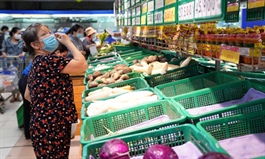Cross-border e-commerce opens 'green lane' for local businesses
Cross-border e-commerce opens 'green lane' for local businesses
The coronavirus pandemic has hit almost every country in the world, including Viet Nam, causing disruption in the global supply chain. Cross-border e-commerce is considered a “green lane” to bring Vietnamese goods to international customers, creating an effective channel to help firms access all markets, experts have said. 
As the unprecedented COVID-19 crisis has forced many countries around the world to close borders and restrict travel, thousands of business meetings, conferences and trade exhibitions between Viet Nam and its major trade partners, such as China, the Republic of Korea, the EU and US, have been cancelled or delayed.
To tackle such challenges, the Ministry of Industry and Trade (MoIT) has cooperated with other ministries, local administrations and overseas trade offices to make use of digital platforms to promote trade and boost exports, according to Deputy Minister Do Thang Hai.
“More than 1 million online trading sessions have been organised and hundreds of thousands of Vietnamese companies have engaged in virtual trade promotion events with potential partners from 55 countries and territories, including many new markets in Africa,” Hai added.
Through these events, growers of seasonal farm produce in Bac Giang, Hung Yen, Son La, Ca Mau, Dak Lak, Soc Trang and other areas have also received support to trade their products on multiple popular online marketplaces like Shopee, Sendo, Voso and Postmart. This has not only helped farmers seek buyers but also attracted more investment into agricultural production and processing.
In this context, online trade promotion is considered inevitable and has received support from businesses to promote connection and restore production as well as expand markets.
Minister of Industry and Trade Nguyen Hong Dien said agriculture was an area where Viet Nam had many strengths and played an important role in the country's sustainable socio-economic development.
In the process of negotiations, the ministry always aimed to achieve the best plan for Viet Nam's agricultural produce and fruit for export, he added.
Currently, the ministry is completing the necessary procedures to export agricultural products and local specialties to the international market through cross-border e-commerce.
To Hoai Nam, general-secretary of the Viet Nam Association of Small and Medium Enterprises, said online trade promotion cost only one-tenth of other trading but was more effective. The outstanding advantage of online trade promotion channels is to shorten the distance among partners, customers and businesses.
“Although the COVID-19 pandemic hinders trade promotion and makes it difficult for exports, Vietnamese goods, especially agricultural produce, are continuously granted passports to penetrate into demanding markets. Thieu lychees have cracked open the door to France, Japan and the Netherlands while Hung Yen’s longan has found its way to the EU. Plum and dragon fruits are getting similar support to go global,” he said.
Tran Trung Kien, director of Viettel Post E-commerce One Member Company (operating the Voso website), told Viet Nam News that online trade promotion had not only been a "salvage" for businesses but also opened up many opportunities for businesses to join the global supply chain.
Viettel Post has promptly seized the opportunity to successfully deploy the Voso e-commerce platform with the goal of turning agricultural produce into specialties. It has set a goal to make the platform the number one specialty exchange floor in Viet Nam.
The Voso website has a competitive advantage of importing goods from farmers, without going through intermediaries to ensure stable prices for customers as well as agricultural produce quality.
“Viettel Post has the strength of a wide network of post offices pning 63 provinces and cities across the country with 1,300 post offices, 6,000 transaction points, 2,500 stores and 18,000 direct sales staff,” he said.
The company targets not only raising the level of Vietnamese agricultural produce, but also aim to support farmers in digital transformation and gradual change in business consciousness.
Its view is that the domestic market is not the only sales channel, nor is the trader the only intermediary. Sellers now have more choices through digital transformation. They can get acquainted with e-commerce floors where they have their own digital store.
This has also been the first e-commerce platform that bring Vietnamese lychees exported to Germany via the cross-border e-commerce platform.
Nguyen Khanh Trinh, Chairman of Clever Group, agreed that e-commerce platforms would be an effective tool to help firms overcome this difficult situation.
Trinh told Viet Nam News that selling directly on cross-border e-commerce platforms was one of the quickest ways to connect products with customers, expand markets and increase export revenue.
This minimises intermediary and operating costs, and distributes products to end-users in many potential markets. At the same time, it is also an opportunity for small and medium-sized enterprises to join the "big playing field,” entering large markets such as North America, Japan, and Europe where many barriers exists and it is costly to trade in the traditional way.
According to Amazon Global Selling Vietnam, there are thousands of Vietnamese businesses exporting through its channel, with revenue in 2020 exceeding US$1 million, three times higher than in 2019.
“However, it is not easy for businesses to meet the legal framework for sales, increasing the number of orders and revenue on cross-border e-commerce platforms. Brand development, improving recognition with foreign consumers, and reducing delivery costs are a headache for many businesses,” he said.
In order to "untie this knot," businesses need to seek advice from partners, foreign regulatory agencies on e-commerce regulations, and Vietnamese regulatory agencies to communicate problems to foreign management agencies.
Vu Ba Phu, director of the MoIT Viet Nam Trade Promotion Agency, said his agency was developing a trade promotion ecosystem mobile app to help Vietnamese firms improve the effectiveness of their promotion activities.
It will also pilot a project providing support for Vietnamese producers to remotely join foreign trade expos and work with renowned global e-commerce platforms like Amazon, Alibaba and Global Sources to help firms cut export promotional costs and introduce their products to global importers and customers, Phu added.



























